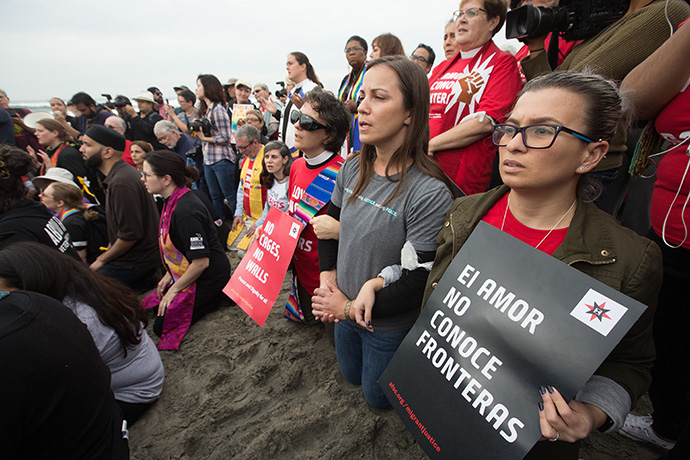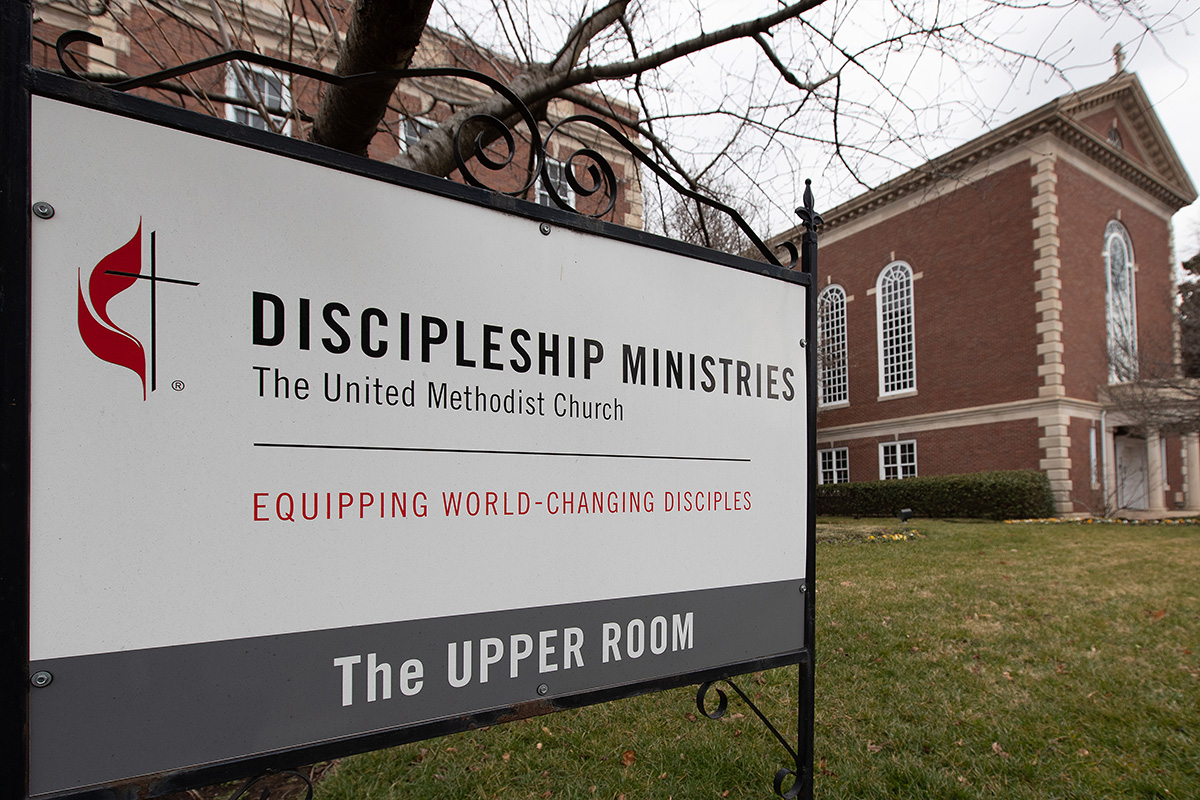Amid the uncertainty around the coronavirus pandemic and potential split in The United Methodist Church in 2021, the 13 general agencies that serve the denomination are cutting budgets, implementing new strategies and pledging to stay true to their missions.
“We will continue to work to help church leaders and annual conferences make disciples of Jesus Christ,” said the Rev. Junius B. Dotson, top executive of Discipleship Ministries, in a typical response to questions posed by United Methodist News to agency officials.
“We do not plan to waver from that mission.”
Ten general agencies rely on church giving for their funding. For those agencies, the total planned expenditures for 2021 is $136.5 million, a reduction from $159.4 million in 2020. That’s a 14.3% decrease. There is a wide variance in the amount of cuts at each agency, and some with deep reserve funds are making up part of the difference themselves.
This is the first of two stories covering agencies. The five commissions and United Methodist Women will follow in a separate installment.

United Methodists and other faith leaders protest at the U.S.-Mexico border near San Diego in 2018 in support of migrants seeking refuge in the U.S. From right are: Emma Escobar of the Baltimore-Washington Conference, Rebecca Cole of the United Methodist Board of Church and Society and the Rev. Julie Wilson of Calvary United Methodist Church in Frederick, Md. Church and Society continues to advocate for climate, health, immigration, peace and poverty with a focus on dismantling racism and colonialism, said the Rev. Susan Henry-Crowe, the agency’s top executive. File photo by Mike DuBose, UM News.
Church and Society
The Board of Church and Society reduced staff from 21 full-time positions at the beginning of 2020 to 17 now. “I hope that we have right-sized for 2021 and until General Conference,” said the Rev. Susan Henry-Crowe, top staff executive.
Since 2016, the agency has been working to align staffing, budget and priorities, she said. It has consolidated some work areas and put more emphasis on others, but it has not had to discontinue any major initiatives or programs. The General Council on Finance and Administration has helped the board streamline its administrative work.
The agency’s priorities are climate, health, immigration, peace and poverty, with a focus on dismantling racism and colonialism, she said.
For staff morale, Henry-Crowe said, “2020 was very up and down.” The staff had to adjust to working remotely because of the pandemic, and then the killings of George Floyd, Breonna Taylor and others gained international attention. “That was devastating to us. We had such a long history of working on racial justice, and that was a gut punch.”
The mixture of COVID-19, violence and racism was difficult to deal with, she said. However, she has detected an “upsurge of energy” with the start of the new year, she said. “I can feel more of a lightness in the staff than there was last fall.”
The United Methodist Building in Washington, where the agency is based, is home to 40 faith communities, Henry-Crowe said. Though activity at the building has been down due to the pandemic and the Jan. 6 violence at the Capitol, the agency has continued engaging with constituents and ecumenical partners through online conferences.
Discipleship Ministries
Discipleship Ministries reorganized its staff structure in 2017-18 in anticipation of looming budget cuts, Dotson said. Agency officials declined to detail how many employees left at that time.
“Morale is actually higher than anticipated,” Dotson said. “The pandemic forced us to work from home beginning in March 2020 and during that time, we have discovered that we became even more productive and more focused on our mission.”
The 110 Discipleship Ministries staffers save an average of 54 minutes a day and $625 in gas expenses annually by eliminating the daily commute, Dotson said.
“This equates to each of us spending 235 fewer hours annually on commuting, which will provide a much healthier work-life balance for our staff,” he said.
The Discipleship Ministries office in the Denman Building near Vanderbilt University is being renovated to be better equipped for use post-COVID-19. Although the staff is primarily working at home, the building is being used for small staff meetings as well as a daily prayer broadcast from the Upper Room Chapel.
Finance and Administration
A 19% staff reduction in 2019 prepared the General Council on Finance and Administration for the budget realities forecast for the coming four years, said Sharon Dean, chief officer of communications, marketing and connectional relations.
“We communicated with our staff when we made the decisions in 2019,” Dean said. “We feel the best way to help morale is by being open and honest.”
Finance and Administration has 55 employees, Dean said, down from 77 at the beginning of 2019.
Finance and Administration is responsible for putting together the denomination’s financial plan with fiscal integrity, strategic-alliance building and steadfastness to historic United Methodist traditions and disciplines.

Bishop Felipe Ruiz Aguilar (left) of the Methodist Church of Mexico, the Revs. Jack Amick (center) of the United Methodist Committee on Relief and Edgar Avitia Legarda of the United Methodist Board of Global Ministries survey a makeshift camp for migrants outside the Benito Juarez sports complex in Tijuana, Mexico, in 2018. Global Ministries, the denomination’s largest agency, has been cutting its operating budget significantly over the past few years. File photo by Mike DuBose, UM News.
Global Ministries and UMCOR
The denomination’s largest agency has been cutting its operating budget significantly over the past few years. The budget for the Board of Global Ministries shrank from $55 million to $33 million since 2018.
The agency cut 68 positions in the past 18 months, said its top executive, Roland Fernandes. Retirement incentives couldn’t be used to encourage voluntary departures, he said, because many of the staff are new, having come aboard since the office’s 2016 move to Atlanta.
The agency now has about 100 employees, which includes United Methodist Committee on Relief staff. Global Ministries is the parent agency of UMCOR.
Fernandes, who took over as top executive in September, doesn’t foresee more reductions in the next year.
He is focusing on five principles: narrowing the agency’s focus, intentional collaborations internally and externally, greater accountability, measuring impact and increasing communication internally and externally.
“We have some short-term stability now given all we have gone through,” he said. “We are the mission agency of the church and God’s mission will go on whether the agency exists or doesn’t exist.”
Higher Education and Ministry
The economic realities of the church have resulted in a reimagining of how the Board of Higher Education and Ministry does its work to be more nimble and sustainable, said Greg Bergquist, its top executive, in a Jan. 15 news release.
Read part two
The agency that supports the development of lay and clergy leaders has completed a 25% reduction in staff, Bergquist said. The reduction encompasses 12 full-time and one part-time position.
“This was an extremely difficult decision,” Bergquist said. “We are losing many talented colleagues who have worked tirelessly to advance our mission over the years. Unfortunately, we had to take this step to remain good stewards and continue supporting the church in a significant way.”
The agency is now structured under three primary areas of focus. Those are constituent relations and services; product innovation and implementation; and administrative relations and services, headed by the Rev. Shannon Conklin-Miller, Janet Jones and Karen Ward, respectively.
“Our new structure opens the door for fresh and innovative opportunities,” Bergquist said. “This is a time for us to become more entrepreneurial and inventive in our approach.”
Publishing House
While COVID-19 was closing church buildings, it also was sabotaging the Publishing House’s sales revenue, prompting leaders to lay off more than a hundred employees and put the Nashville, Tennessee, headquarters up for sale.
After the most recent reduction, which was announced in January, the agency will have 161 staff, down from about 300 at the beginning of 2020.
The Publishing House, unlike other key United Methodist agencies, gets no apportionment dollars — that is, shares of church giving. Sales are running about 57% under pre-pandemic levels.
“The consequences of depressed sales make it imperative that we lower costs,” said the Rev. Brian Milford, the Publishing House’s president and publisher, in a Jan. 27 news release. “Current levels of deficit spending cannot be sustained as we wait for churches to resume in-person activities.”
The agency had already forecast an operating loss for fiscal year 2021.
The Publishing House provides United Methodists (and other mainline Protestants) with Wesleyan-focused Sunday school and vacation Bible school materials, an array of Bible translations and editions (including its own recent Common English Bible), books on Christian faith and church leadership, the online magazine Ministry Matters, the United Methodist Hymnal and the Book of Discipline.
It also sells church supplies — everything from clergy robes to pre-packaged communion elements, which have been in demand during the pandemic.
Wespath
The COVID-19 pandemic in 2020 caused the agency that manages pension and health benefits for The United Methodist Church to prioritize coronavirus-related federal legislation that affected health and retirement plans.
The U.S. CARES Act and Payroll Protection Program, which required minimum distributions and loan changes, all required significant attention from Wespath Benefits and Investments, said Eileen Kane, chief financial and information officer.
“Our immediate goal was to be a resource and non-anxious presence for constituents, helping them manage through the health and financial upheaval caused by the pandemic,” Kane said.
Like the Publishing House, Wespath also does not receive funding through apportionments. However, it is affected by significant shifts in financial markets.
“Therefore, we continue to manage our 2021 expenses and resources with strong discipline and stewardship, closely monitoring our budget to minimize any impact on participant and institutional investor funds or associated fees,” Kane said.
When financial markets fell dramatically in 2020, the Wespath senior leadership team curtailed travel, meeting and other non-essential expenses; froze all job openings, which affected 30 new and vacant positions; developed contingency plans for depression-type disruption in the economy and financial markets; and undertook rigorous ongoing communication with participants, plan sponsors and investors.
The agency has 266 employees.
Going forward, Wespath has prioritized projects that support significant changes to be considered by the General Conference. Those include the proposed Protocol of Reconciliation and Grace through Separation that would split the church, and Compass, the new clergy retirement plan.
“Although certain initiatives were deferred at the start of the pandemic, as changing market conditions have allowed, they have been reinitiated,” Kane said.
Patterson and Gilbert are UM News reporters in Nashville, Tennessee. Sam Hodges and Tim Tanton contributed to this story. Contact Patterson at 615-742-5470 or newsdesk@umcom.org. To read more United Methodist news, subscribe to the free Daily or Weekly Digests.
Like what you're reading? Support the ministry of UM News! Your support ensures the latest denominational news, dynamic stories and informative articles will continue to connect our global community. Make a tax-deductible donation at ResourceUMC.org/GiveUMCom.




